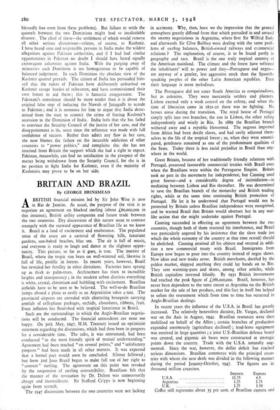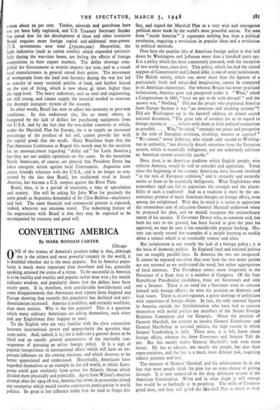BRITAIN AND BRAZIL
By GEORGE BRINSMEAD
ABRITISH financial mission led by Sir John Wise is now in Rio de Janeiro. As usual, the purpose of the visit is to negotiate an agreement on blocked sterling (about £6o,000,000 in this instance), British utility companies and future trade between the two countries. Dry discussions of this nature seem to contrast strangely with the outward appearance of Brazilian life as we know it. Brazil is a land of excitement and exuberance. The populated areas of the coast are a carnival of flowering hills, luxuriant gardens, sun-baked beaches, blue sea. The air is full of music, and everyone is ready to laugh and dance at the slightest oppor- tunity. This picture, so far as it goes, is true. The interior of Brazil, where the tropic sun beats on well-watered soil, likewise is full of life, prolific in forests. In recent years, however, Brazil has revealed her fertility in other directions. Factories have sprung up as thick as palm-trees. Architecture has risen to incredible heights and transparency ; in the modern urban districts everything is white, crystal, chromium and bubbling with excitement. Brazilian airfields have to be seen to be believed. The well-to-do Brazilian jumps aboard a plane as easily as an Argentinian takes a taxi. .The provincial airports are crowded with chattering bourgeois carrying armfuls of cellophane packages, orchids, chocolates, ribbons, fruit. Even inflation has flourished with tropical luxuriance in Brazil.
Such are the surroundings in which the Anglo-Brazilian negotia- tions will be conducted. The financial antecedents are none too happy. On 3oth May, 1947, H.M. Treasury issued an optimistic statement regarding the discussions, which had then been in progress for a considerable time. The talks, it was announced, had been conducted " in the most friendly spirit of mutual understanding." Agreement had been reached "on several points," and "satisfactory progress " had been made in all other matters. It was expected that a formal pact would soon be concluded. Silence followed ; but from 2nd June Brazil began to make full use of her right to " convert " sterling. The agreement on this point was revoked by the suspension of sterling convertibility. Brazilians felt that the manner of the revocation by Dr. Dalton was unnecessarily abrupt and inconsiderate. Sir Stafford Cripps is now beginning again from scratch.
The 1947 discussions between the two countries were not lacking in acrimony. Why, then; have we the impression that the general atmosphere greatly differed from that which prevailed in and around the stormy negotiations in Argentina, where first Sir Wilfrid Eady
and afterwards Sir Clive Baillieu were dealing with the same prob- lems of sterling balances, British-owned railways and ce---..nmercia1 relations ? The explanation, of course, is to be found partly in geography and race. Brazil is the one truly tropical country of the American mainland. The climate and the forest have softened
the inhabitants' will to power and they—Portuguese and negro- are anyway of a gentler, less aggressive stock than the Spanish- speaking peoples of the other Latin American republics. Even their language is more melodious.
The Portuguese did not enter South America as conquistadores, but as colonists. They were mercantile settlers and planters. Lisbon exerted only a weak control on the colony, and when the time of liberation came in 1821-22 there was no fighting. No heroes arose during the transition. The royal house of Portugal
simply split into two branches, the one in Lisbon, the other ruling independently and wisely in Rio. In 1889 the Brazilian branch withered away and a republic blossomed. The negroes imported from Africa had been docile . slaves, and had easily adjusted them- selves to the life of the tropical forest ; so, when they were emanci- pated, gentleness remained as one of the predominant qualities of the State. Today there is less racial prejudice in Brazil than any- where in the world.
Great Britain, because of her traditionally friendly relations with Portugal, possessed favourable commercial treaties with Brazil even when the Brazilians were within the Portuguese Empire. Britain took no part in the movement for independence, but Canning used great finesse—and a considerable degree of intimidation—in mediating between Lisbon and Rio thereafter. He was determined to save the Brazilian branch of the monarchy and British trading rights, while at the same time continuing British protection of Portugal. He let it be understood that Portugal would not be protected by Britain unless Brazilian independence were recognised, and he warned Brazil that Britain would obstruct her in any war- like action that she might undertake against Portugal.
Canning succeeded in effecting an agreement between the two countries, though both of them resented his interference, and Brazil was particularly angered by his insistence that the slave trade (on which the whole economy of the country at that time rested) should be abolished. Canning attained all his objects and secured in addi- tion a new commercial treaty with Brazil. Immigrants from Europe now began to pour into the country instead of negro slaves. New ideas and new trades arose. British merchants, dazzled by the golden market, shipped anything they could lay hands on to Rio. They sent warming-pans and skates, among other articles, while British capitalists invested blindly. By 1931 British investments had reached the peak figure of £286,000,000. Brazil, however, has never been dependent to the same extent as Argentina on the British market for the sale of her produce, and this fact in itself has helped to soften the resentment which from time to time has occurred in Anglo-Brazilian dealings.
In recent years the influence of the U.S.A. in Brazil has greatly increased. The relatively benevolent dictator, Dr. Vargas, declared war on the Axis in August, 1942. Brazilian resources were then mobilised on behalf of the Allies ; certain branches of production expanded enormously (agriculture declined); lend-lease equipment was received in large quantites ; a joint U.S.-Brazilian defence board was created, and gigantic air bases were constructed at strategic points down the country. Trade with the U.S.A. naturally aug- mented. Since the war, however, the dollar deficit has reached serious dimensions. Brazilian commerce with the principal coun- tries with whom she now deals was divided in the following manner during the period January-October, 1947. The figures are in thousand million cruzeiros.
Imports Exports U.S.A. 11.75 6.5 Argentina 1.25 1.75 U.K. 1.25 1.50 Coffee still represents about 35 per cent. of Brazilian exports and
cotton about 20 per cent. Timber, minerals and petroleum have not yet been fully exploited, and U.S. Treasury Secretary Snyder has stated that for the development of these and other resources Brazil requires more foreign capital and additional man-power. (U.S. investments now total LI50,000,000.) Meanwhile, the light industries (such as cotton textiles) which expanded spectacu- larly during the war-time boom, are feeling the effects of foreign competition in their export markets. The dollar shortage com- pelled the Government to restrict imports last year, and as a result local manufacturers in general raised their prices. The movement of workpeople from the land into factories during the war has led to scarcity of many essential articles of food, and further forced
up the cost of living, which is now about times higher than the 1939 level. The heavy industries, such as steel and engineering, are still young, and cannot supply the material needed to renovate the decrepit transport System of the country.
In other words, Brazil has now to adjust her economy to post-war conditions. In this endeavour she, like so many others, is hampered by the lack of dollars for purchasing equipment from the U.S.A. and by the fact that the non-dollar countries to which, under the Marshall Plan for Europe, she is to supply an increased percentage of the produce of her soil, cannot provide her with the capital goods that she needs. Many Brazilians hope that the Pan-American Conference at Bogota this month may be the occasion for an announcement regarding " dollar aid " for Latin America ; but they are not unduly optimistic on this score. In the meantime North Americans, of course, are pleased that President Dutra has taken energetic action against local Communists. Argentina now enjoys friendly relations with the U.S.A., and is no longer so con- cerned by the fact that Brazil, her traditional rival in South America, has become a U.S. outpost against the River Plate.
Brazil, then, is in a period of transition, a time of speculation and anxiety. She will be asking Sir John Wise for precisely the same goods as Argentina demanded of Sir Clive Baillieu—machinery and fuel. The same financial and commercial pattern is repeated, indeed, wherever our missions travel. The redeeming feature of the negotiations with Brazil is that they may be expected to be accompanied by courtesy and good will.































 Previous page
Previous page